Kitchens come in all shapes and sizes, which makes it much harder to find a rug for your kitchen. You probably have a dozen questions but just can’t seem to find the answers.
What type of carpet should I get? Should I go dark or stay light? Will a patterned mat throw off the design style I’m trying to capture?
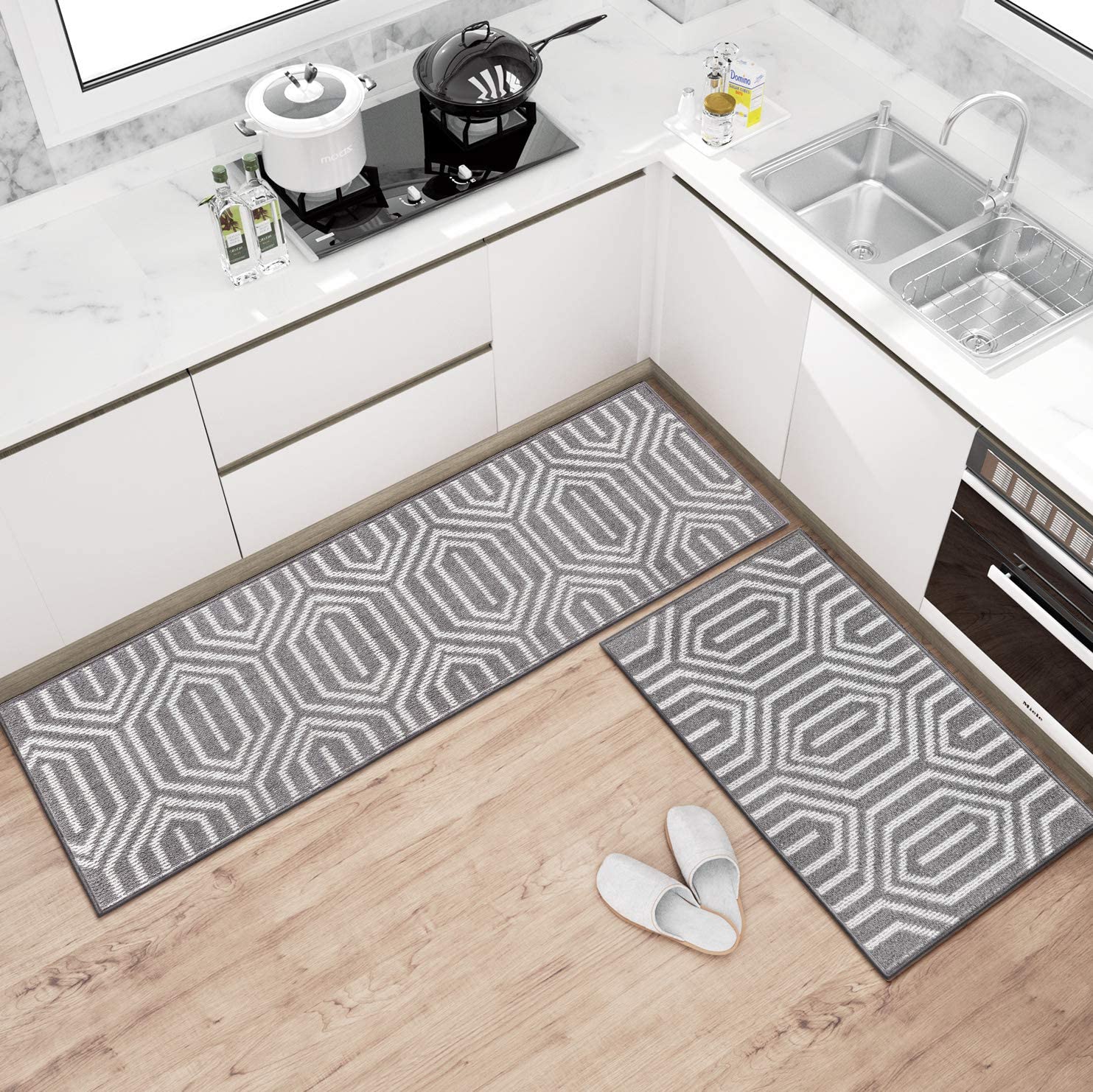
What a headache! Don’t sweat it because we’re about to ease your mind and help you with your decision. Here are some good answers to your questions that will help you choose the perfect kitchen rug.
What Is Your Kitchen Room Size?
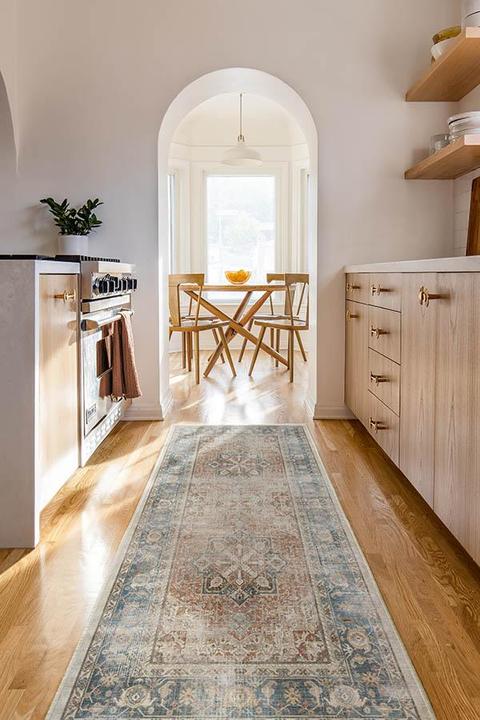
One of the first things you should do, before looking at carpets, is to measure your kitchen room size. You’d be pretty upset if you got home with your newly purchased rug and come to find out it doesn’t fit in the space that you’d like it to.
Yes, there is a little bit of math homework to do, but it should be quick to do. Once that easy task is out of the way, you’re ready to start exploring ideas for kitchen rugs.
What Size Of Rug Do You Need?
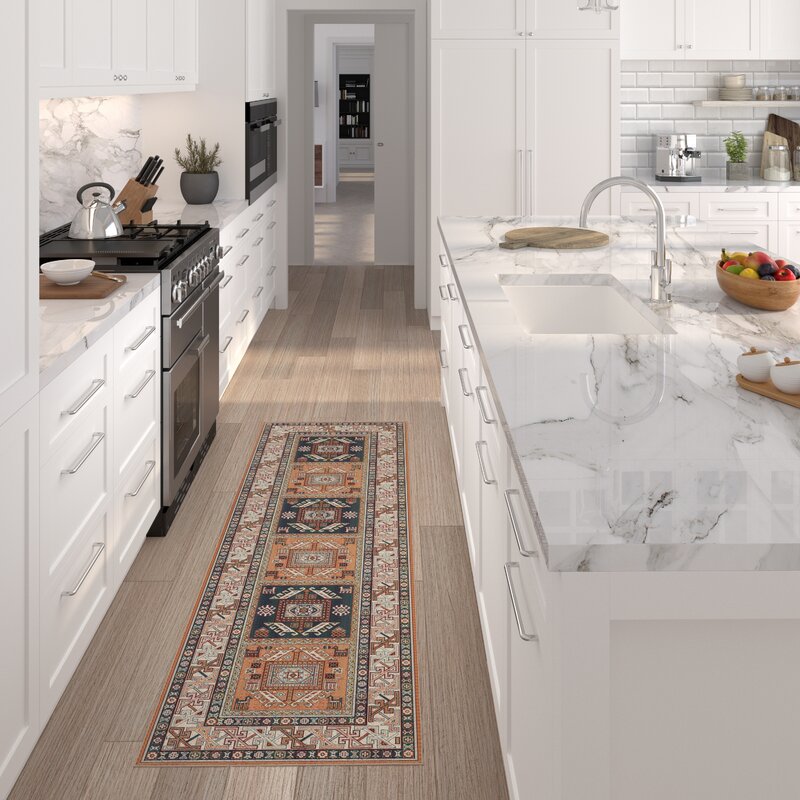
So, you measured your kitchen floor and now you need to figure out what size of rug to buy. You’ll want to decide on how much floor space you want to show.
General dimensions when choosing your kitchen carpet size:
- Large Kitchen Rug Sizes = Over 200 Square Feet
- Medium Kitchen Rug Sizes = 100 to 200 Square Feet
- Small Kitchen Rug Sizes = Under 70 Square Feet
Large Kitchen Rug Sizes
In a large kitchen, you can place one large rug down or if you have an island, you can place a runner or two on each side of the island. The goal is to outline the length of your countertops. This will make your kitchen look a lot bigger than it is.
Large Kitchen + Kitchen Island = Runner rugs. The rug sizes you’ll be searching for are 3’x5’, 5’x7’, or runner rugs.
Medium Kitchen Rug Sizes
For a medium-sized kitchen, the best rug options are an area rug or one runner lining one length of a counter (preferably the countertop with the sink).
Adding multiple runners in a medium kitchen because it may look cluttered and awkward.
The area carpet sizes to be on the lookout for are 3’x5’ and 5’x7.’ If you like the runner rug idea more, try out a 2.5’x7’ rug in your kitchen.
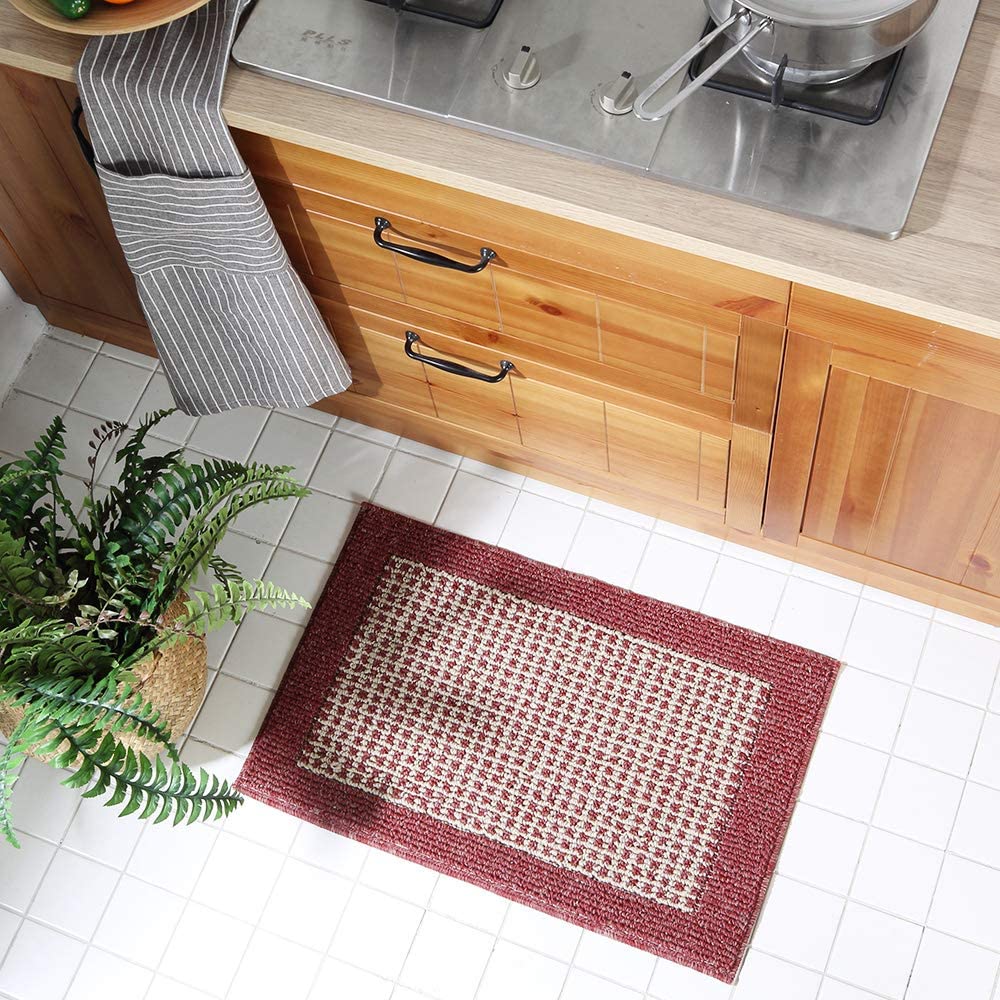
Small Kitchen Rug Sizes
Don’t bow your head in shame! Small kitchens are equally amazing to decorate with a kitchen rug.
If you decide to add a rug to your kitchen, stick to a small rug like a 2’x3’ or 3’x5.’ A runner can also be added if it’s 2.5’ by 7.’
What Rug Shapes Can You Choose From?
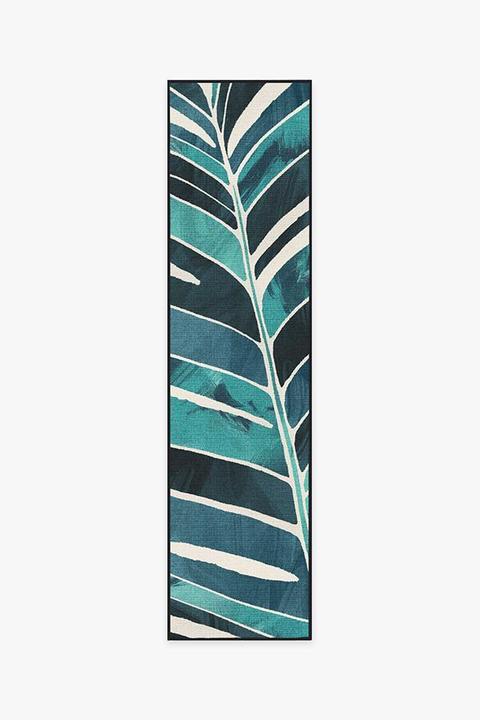
Most people choose a rectangular or square rug as their first choice. It’s a prudent and fantastic way to really outline your kitchen.
Some other options that may be cute are half moon rugs. They look wonderful and charming at the sink or in front of a stove.
Nowadays, people are even adding round rugs to their kitchens. Adding a geometrical-shaped rug is perfect for contemporary design-styled kitchens.
Where Should You Place A Kitchen Rug?
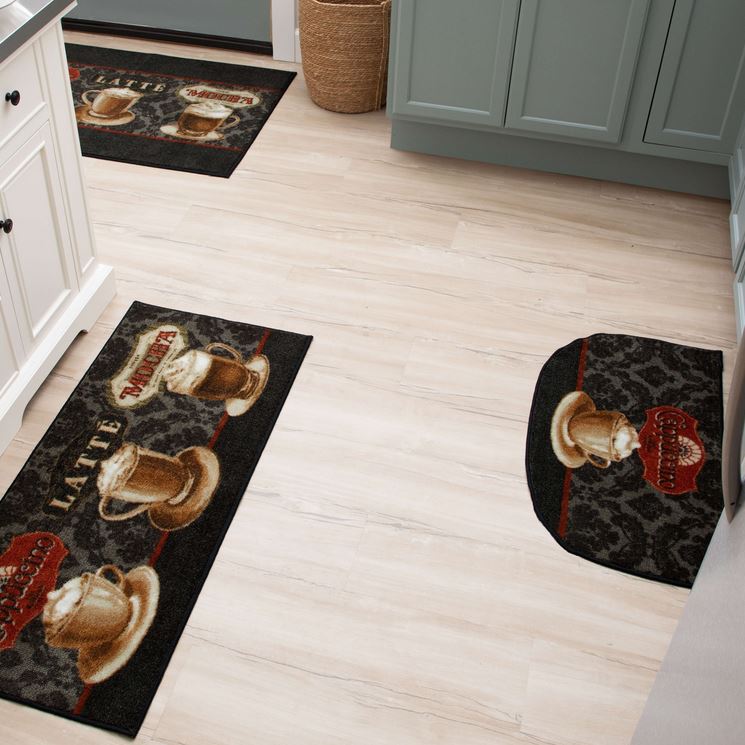
Kitchen rugs are placed either in the center of a kitchen or lining the side of a countertop. You’ll see some runners placed directly underneath bar stools, outlining the side of the island.
A great tip to keep in mind is if you do place a runner near the island, make sure it fits all legs of the bar stool on it. Also, try not to place your carpet under your island because it makes it harder to pull it out and clean it.
For some of the kitchen shapes, like the u-shaped kitchen, a carpet looks best when it’s placed in the center of the room. Small kitchen rugs look great at the sink or the stove. Avoid putting a rug near a fridge, it tends to get cruddy quickly!
How Do You Color Coordinate Your Rug With Your Kitchen?
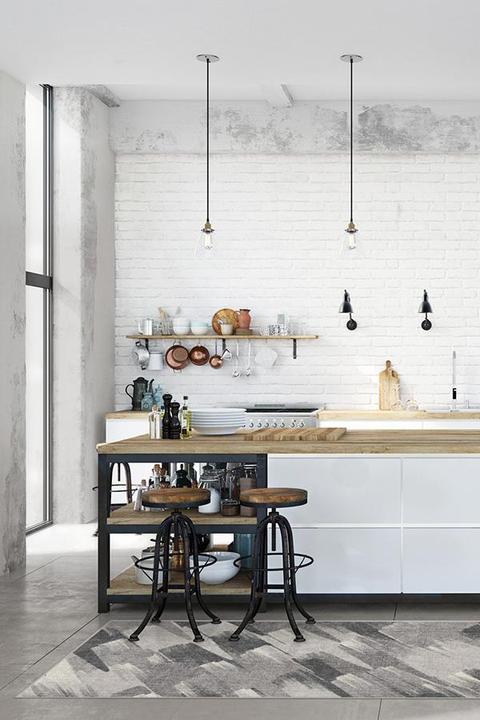
Take a gander around your kitchen to see what colors you have going on. To color coordinate and tie in your perfect kitchen rug, you’ll need to choose 2 or 3 main colors from your kitchen.
Remember, choosing the color of your carpet can change the mood and feel of your kitchen. Pink, red, orange, and yellow hues will draw a lively warm feel. Green, blue, and purple colors will give your kitchen a calming presence.
A dark rug in a large kitchen will look nice but add it to a small kitchen and you’ve just lost a ton of space. Instead, add a light rug to a small kitchen and make it feel more open.
What Features Should You Look For In A Kitchen Rug?
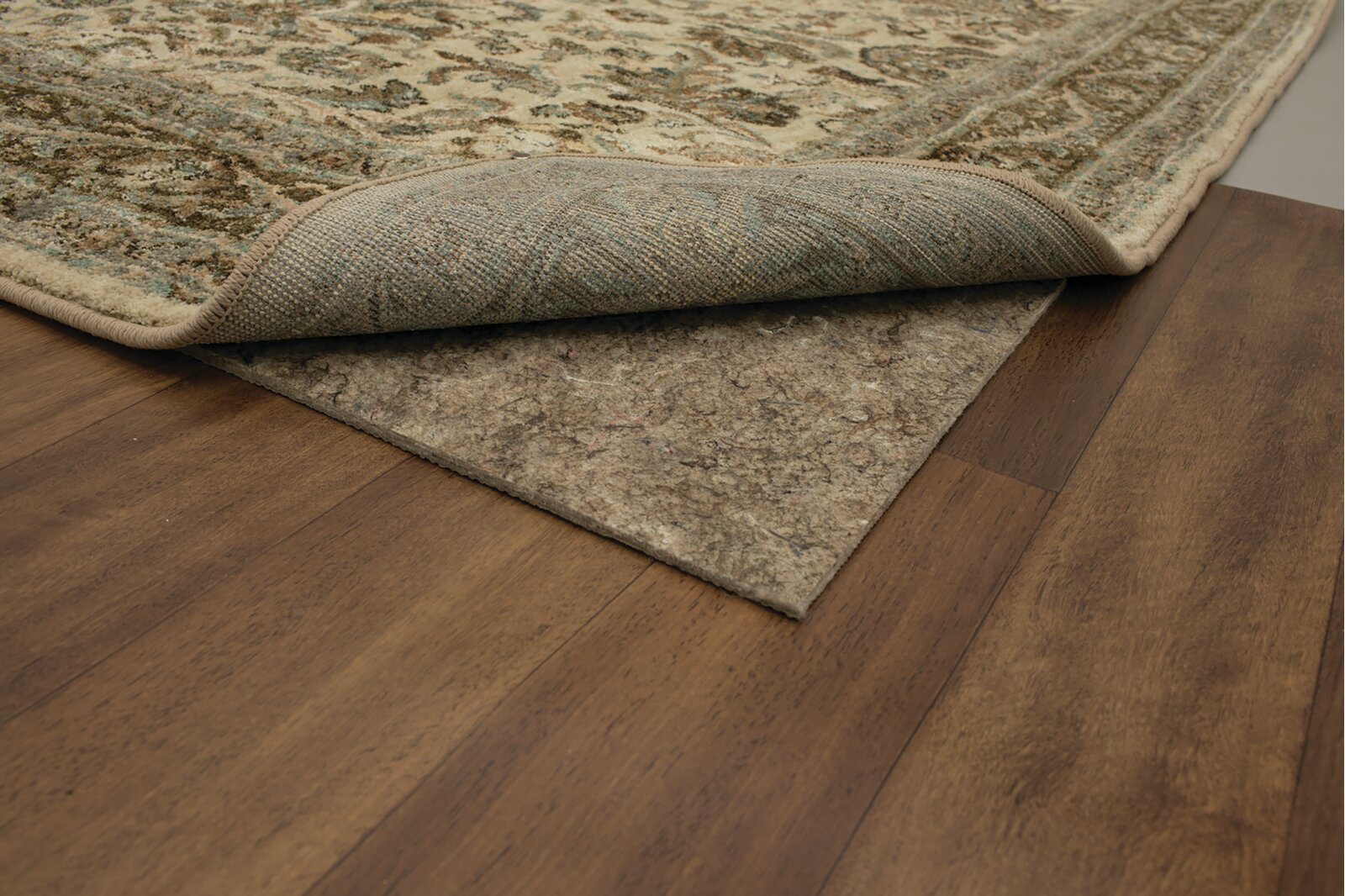
The three main features you should look for in a kitchen rug are slip resistance, stain resistance, and water resistance. You’re going to encounter all three in a kitchen setting.
Some companies spray a non-slip rubber underneath their carpets. While others give you the option to buy a non-slip carpet pad that fits the size of your carpet. If you don’t have either of these options buy yourself some rug gripper tape.
Another feature that may be for you is a foam standing mat. They are comfortable to stand on, easy to clean, stain resistant, and water-resistant.
What Carpet Fabric Types Can You Choose From?
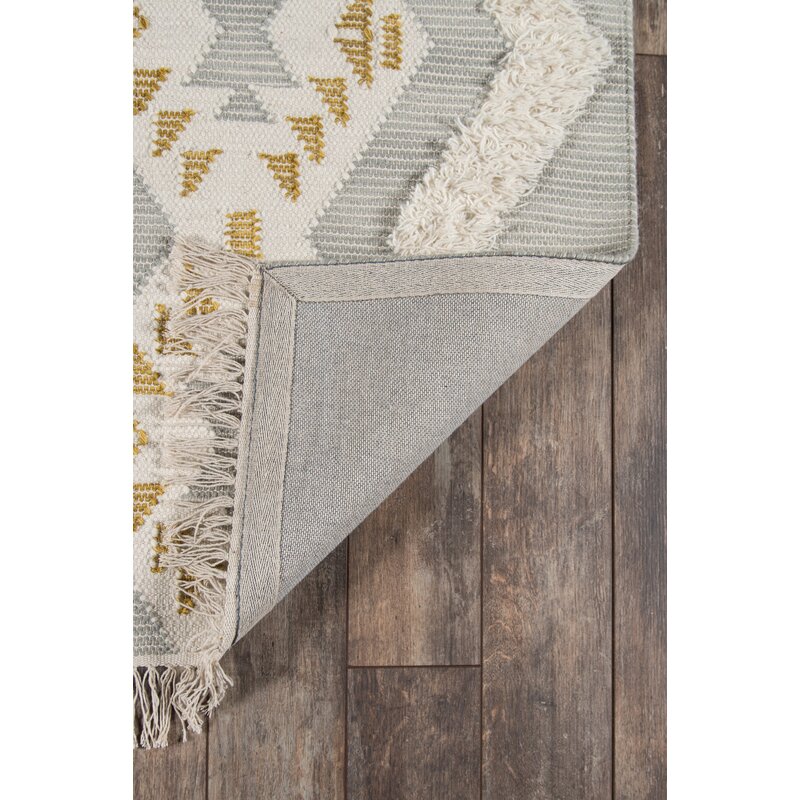
Carpet fabric in a kitchen is a big factor in choosing the perfect kitchen rug. With the amount of foot traffic and spills that happen, you’ll need a washable and durable fabric.
The best carpet fabrics for your kitchen are:
- Cotton
- Natural Fiber (Jute, Sisal, Bamboo)
- Polyester
- Polypropylene
- Wool
Cotton is one of the easiest carpet fibers to clean. Cotton rugs are great for families with kids that accidentally knock over their juice cups! A great option to buy is the flatweave cotton rug.
Natural Fiber rugs are extremely durable and scrubbing them down with a bristle brush won’t destroy them. Polyester and polypropylene are logical choices because they are non-flammable and the easiest to clean.
Wool is a perfect option for you if you like walking on a warm kitchen floor in the morning over a cold tile floor. It’s also water and stain resistant.
Can A Kitchen Rug Be Too Thick?
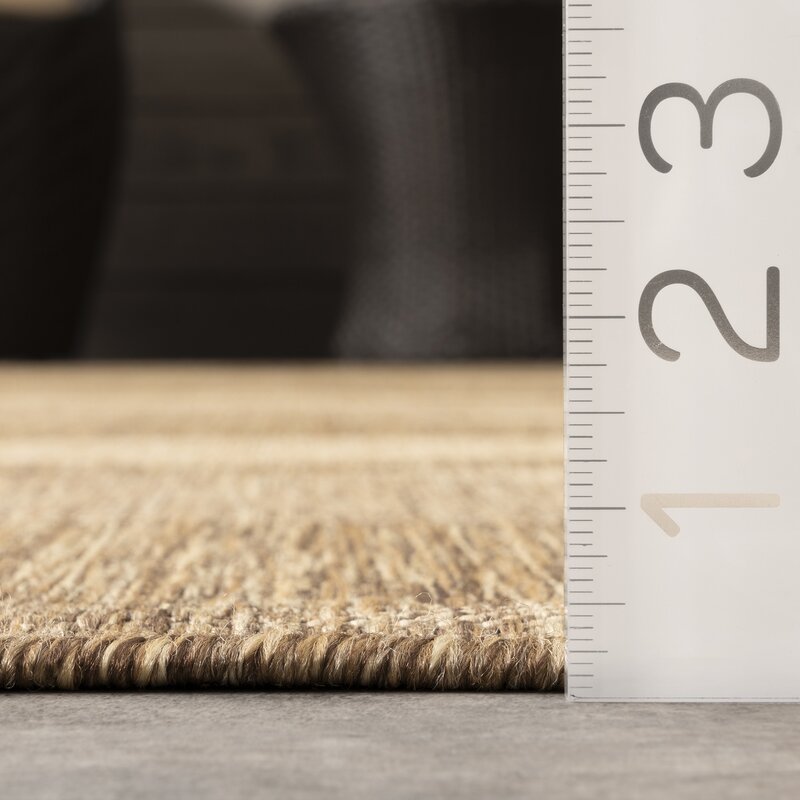
The answer is yes. It’s safer to choose thinner rugs in the kitchen because it’s too easy to trip on a thicker rug. Of all the places to possibly trip over a rug, the worst would be the kitchen!
The thickness of a rug is also referred to as “pile.” In case you’re at the carpet store, and hear the word “pile,” You’ll know what they’re talking about!
Low pile rugs are rugs that are ¼ inch or shorter. Rugs that are low pile are flat weave or Saxony.
What Are Your Current Kitchen Decorations?
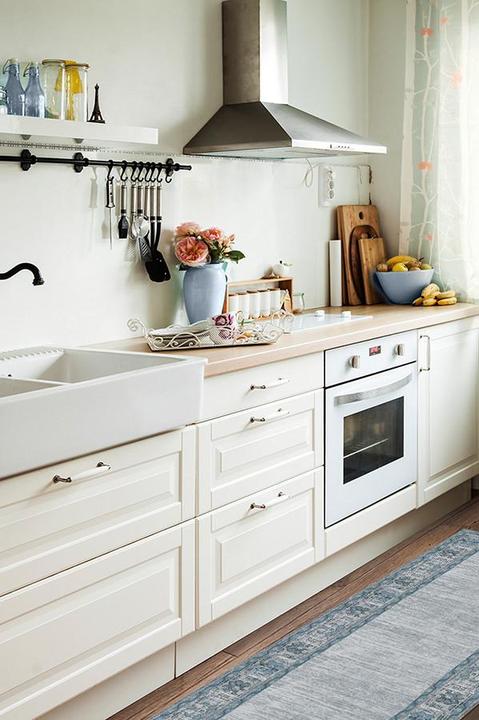
You’ll want to keep this in mind when shopping for your perfect kitchen rug. If your kitchen is currently decorated with bright bold colors, you’ll want to opt for a neutral-toned carpet to prevent your colors from competing.
If your kitchen falls more in the “plain Jane” category and you want to make your kitchen brighter, add a solid-colored or multi-colored carpet. This is a great option for folks who live in apartments and can’t change kitchen colors and décor.
A good rule when combining kitchen décor with kitchen rugs is to stick to one theme. Mixing too many colors and patterns can disrupt the design flow in your kitchen.
What Kitchen Rugs Pair Well With Your Design Style Preference?
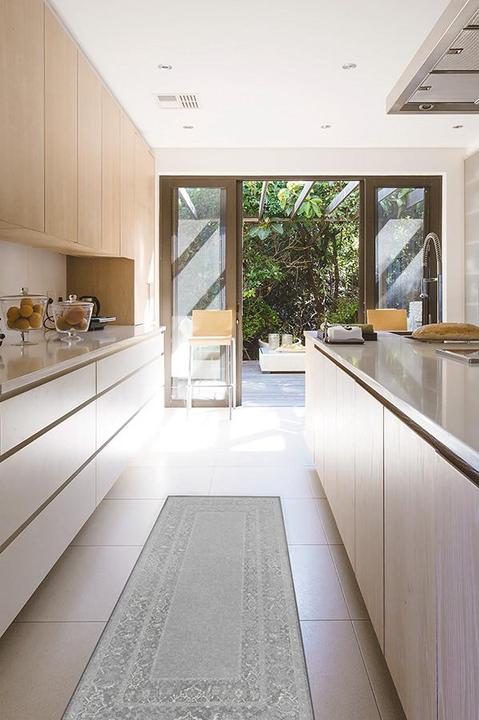
Shopping for kitchen carpets with a design style in mind is super handy! Here is a list of design styles and rugs to go with them.
- Bohemian = Colorful patch boho with neutral or white cabinet doors
- Contemporary = Blue diamond or herringbone-patterned runner
- Modern = Black and white checkered runner with light wood floors and counters
- Rustic/Farmhouse = Neutral toned jute or sisal flatweave runner
- Traditional = Red elegant Persian rug with neutral-toned countertops and cabinets
The key is to play the opposite game. Mix a neutral tone with a colorful tone, or a busy pattern with a simple plain design. If your kitchen has neutral colors, you can’t go wrong with a colorful rug.
Key points to consider when shopping for a kitchen rug
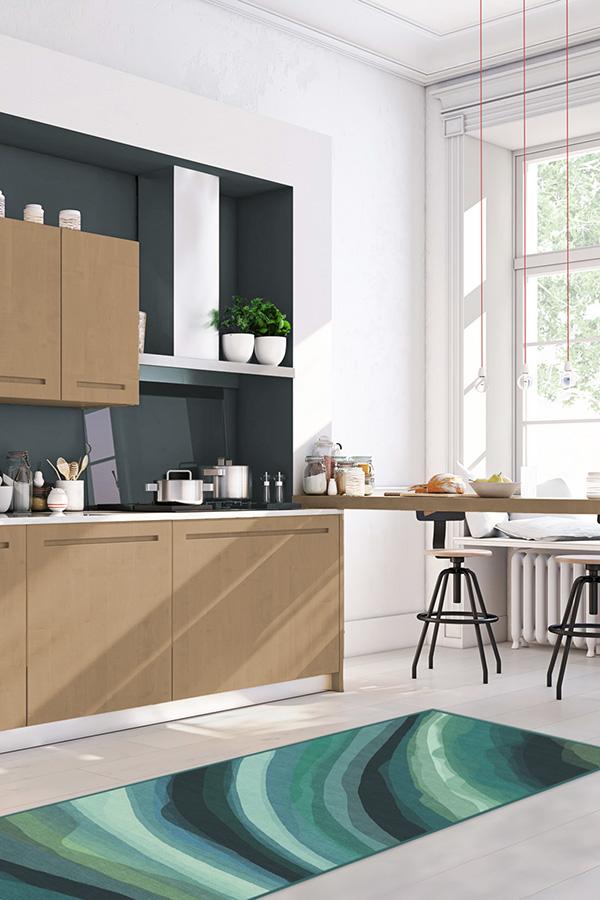
A good general rule of thumb is to leave 18 inches of floor space between your rug and counter. This rule changes to 12 inches to 18 inches if you want to add 3 runners around a kitchen island.
U-shaped kitchens can sometimes be tricky. The best placement for your area rug would be as much in the center of the kitchen as possible while still leaving 18 inches to 24 inches of floor space between the rug and counter.
Kitchen rugs should always match if you’re standing in one place and you can see them both. Matching carpets are one more way to tie a whole kitchen design together.
It’s not important to match the countertops and cabinets exactly to your rug. You want your kitchen to compliment your rug and you don’t need to be over the top to do so.
The best size for a rug you’re planning to place below the sink is 6 inches longer than the length of the sink. If you spend quite a bit of time at the sink or the stove, find a cushioned mat instead of a rug.
Kitchens are high trafficked areas, especially in galley-style kitchens. Choosing a runner that’s at least 10 feet long and made for indoor/outdoor is your best option.
If your kitchen has a reading nook add a round rug! It will pull the kitchen and dining room areas together nicely.
A new trend is going around for contemporary décor styles. An octagon-shaped rug is an interesting geometric way to emphasize a kitchen.
For a timeless and classic feel, add a bold and colorful striped runner beside your kitchen island. Striped carpets will go with just about every design style. Striped rugs can fit with floral, plaid, damask, polka dot, leopard print patterns.
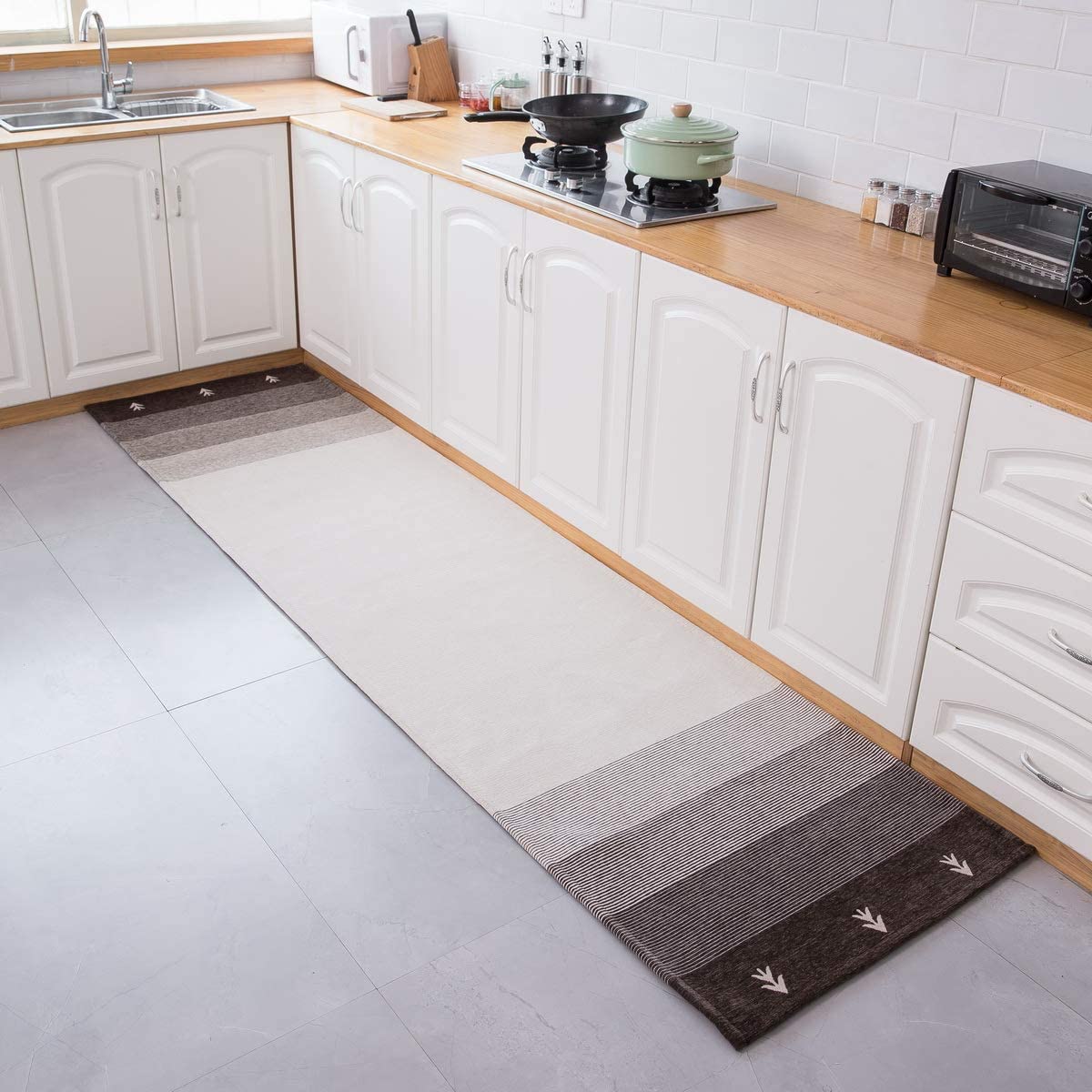
Conclusion
We’ve given you the answers to several of the more commonly asked questions about kitchen rugs. You have a guide to help you pick out carpet patterns, colors, pile, material, and length, and match it accordingly to your specific kitchen.
When you’re out shopping and trying to figure out how to choose the perfect kitchen rug, remember 3 things, size, color design, and type of fabric. If you can remember this, then you’re ready to find the carpet that best suits your kitchen.
